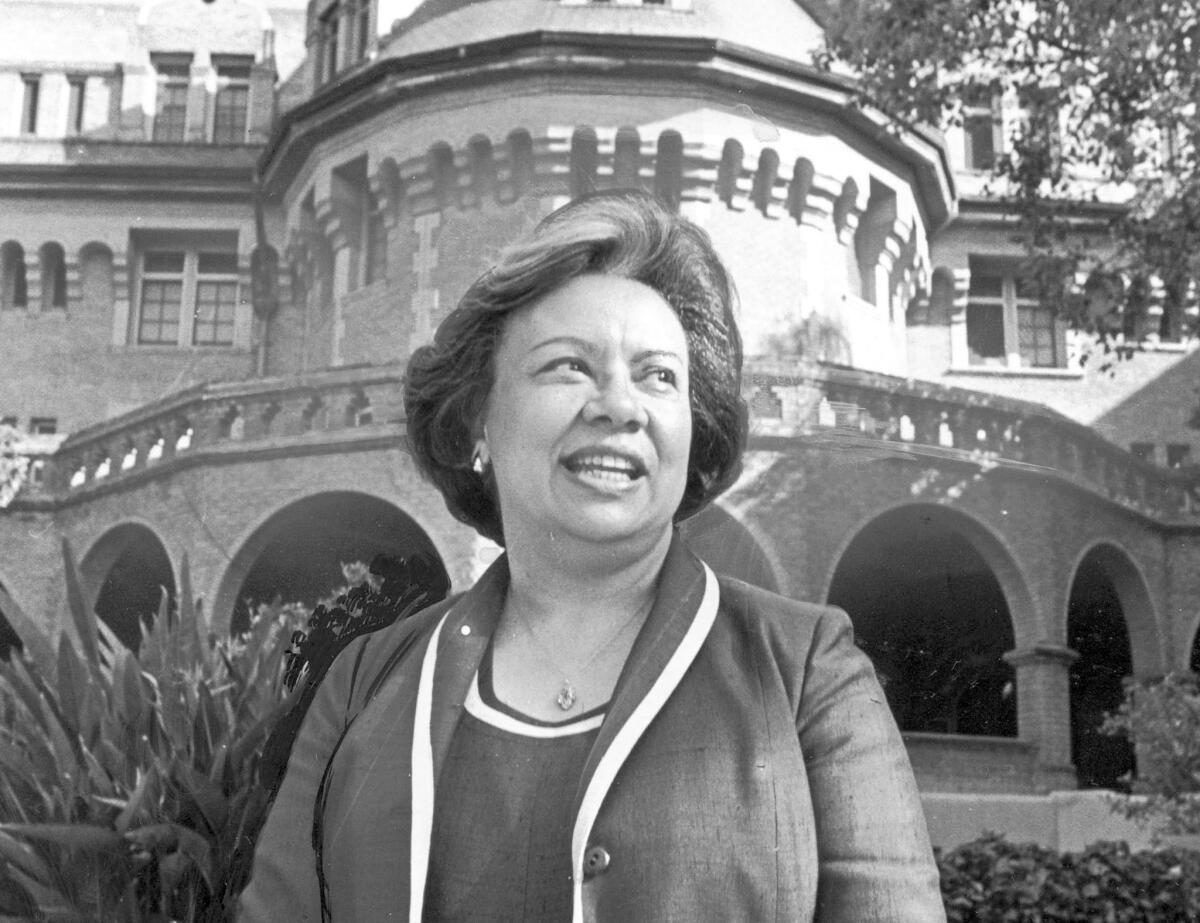Marilyn Hudson dies at 88; L.A. civic leader broke society race barriers

Marilyn Hudson in March 1980.
In an era when few minorities of any kind belonged to Los Angeles’ social and civic elite, Marilyn Hudson was sometimes seen as the token black, but she didn’t mind.
A decade after the Watts riots, she helped guide urban renewal on the board of the city’s powerful redevelopment agency. She also helped set priorities on the board of the venerable Automobile Club of Southern California, which she later chaired.
She was mentioned in society columns alongside Ahmansons, Bings and other mavens of L.A.’s upper crust, joining them in charitable fundraising and on international goodwill tours.
“I see being the first black as an asset rather than a handicap,” she told The Times in 1980. “Most of the women in these groups never experience minority women. Through me, they get exposure.”
Hudson, who broke barriers quietly at a time when racial militancy was in vogue, was 88 when she died Sept. 25 at her Los Angeles home. Her daughter, Karen Hudson Freeman, said the cause was cancer.
She was one of the last members of a vibrant black establishment that took root in Los Angeles in the 1940s and ‘50s, nurturing political leaders like Tom Bradley and community icons like John Mack.
“She was proud of being African American, and she was able to educate the wider community about the lives and concerns of African Americans,” said Valerie Lynne Shaw, a family friend and former president of the Los Angeles Board of Public Works. “She represented African Americans in arenas where they had never been represented before.”
Born in Los Angeles on Christmas Day in 1926, Hudson grew up in privilege as the daughter of Paul R. Williams, the trailblazing African American architect whose houses for Hollywood royalty and landmarks such as the Polo Lounge brought elegance to parts of the city where blacks were long barred from owning property.
Her mother, Della Givens Williams, was a force in her own right. In 1941, when African Americans were shut out of the city’s finest establishments, she co-founded the Wilfandel Club with her friend, Fannie Williams. Located in a stately house in the West Adams district, it served for decades as the hub of local black society.
After graduating from Los Angeles High School, Hudson went on to study social work at USC.
In 1946 she married Elbert Hudson, the scion of another prominent black family. He later succeeded his father, H. Claude Hudson, as president of Broadway Federal Savings, one of the oldest black-owned banks in the country.
------------
FOR THE RECORD
Oct. 4, 9:28 p.m.: An earlier version of this article misidentified H. Claude Hudson as T. Claude Hudson.
------------
Besides her husband and daughter, Hudson is survived by a son, Paul, who was the third generation of the family to run Broadway Federal.
Although Hudson did not need a paying job, “she worked harder than a lot of people who had a 9 to 5,” Freeman recalled.
A Times reporter who trailed her for a 1980 profile wrote that Hudson’s day started at 7:30 a.m. when she left her home for a series of Community Redevelopment Agency meetings. It didn’t end until 9:30 p.m. after a board meeting of Women on Target, an organization of black women activists.
She still found time to be a gracious hostess who often used her parties to connect people from different backgrounds and share black culture.
“If she knew the guests were going to be overwhelmingly white, she felt quite comfortable serving gumbo, very Southern style,” recalled attorney Channing Johnson, who is African American. “It was like a silent education.”
Hudson credited her parents with instilling a strong sense of identity and providing opportunities that eased her entrée into all-white groups. “I’d had exposure to situations where there were few minorities ever since school,” she said in 1980. “It wasn’t forced. I was just there. Anyway, I’ve never been afraid to venture out.”
Appointed to the Community Redevelopment Agency board in 1975, Hudson was its sole black member for much of her nine-year tenure. Among her successes was advocating for Watts’ first shopping center, which the agency approved in 1980, 15 years after the riots that decimated the area.
“She was a bridge between two communities,” said Johnson, who headed the nonprofit corporation that spearheaded the shopping center. “She was active in making sure the black community got its share of redevelopment dollars.”
She brought the same sensitivity to the Auto Club. Believed to be the first black woman on the club’s board when she joined in 1979, she accepted the position at a time when redlining and other discriminatory practices in the car insurance industry were making news.
“She was concerned there wasn’t enough access to auto insurance in the black community,” recalled Thomas V. McKernan, the club’s longtime chief executive.
Yet Hudson, who remained on the Auto Club board for two decades, was not a table-pounding crusader.
“She was very good at articulating her point of view and encouraged change, but she wanted to do it in a way that respected and cared about people,” said McKernan, who called her “a great mentor.”
Twitter: @ewooLATimes
More to Read
Start your day right
Sign up for Essential California for the L.A. Times biggest news, features and recommendations in your inbox six days a week.
You may occasionally receive promotional content from the Los Angeles Times.







